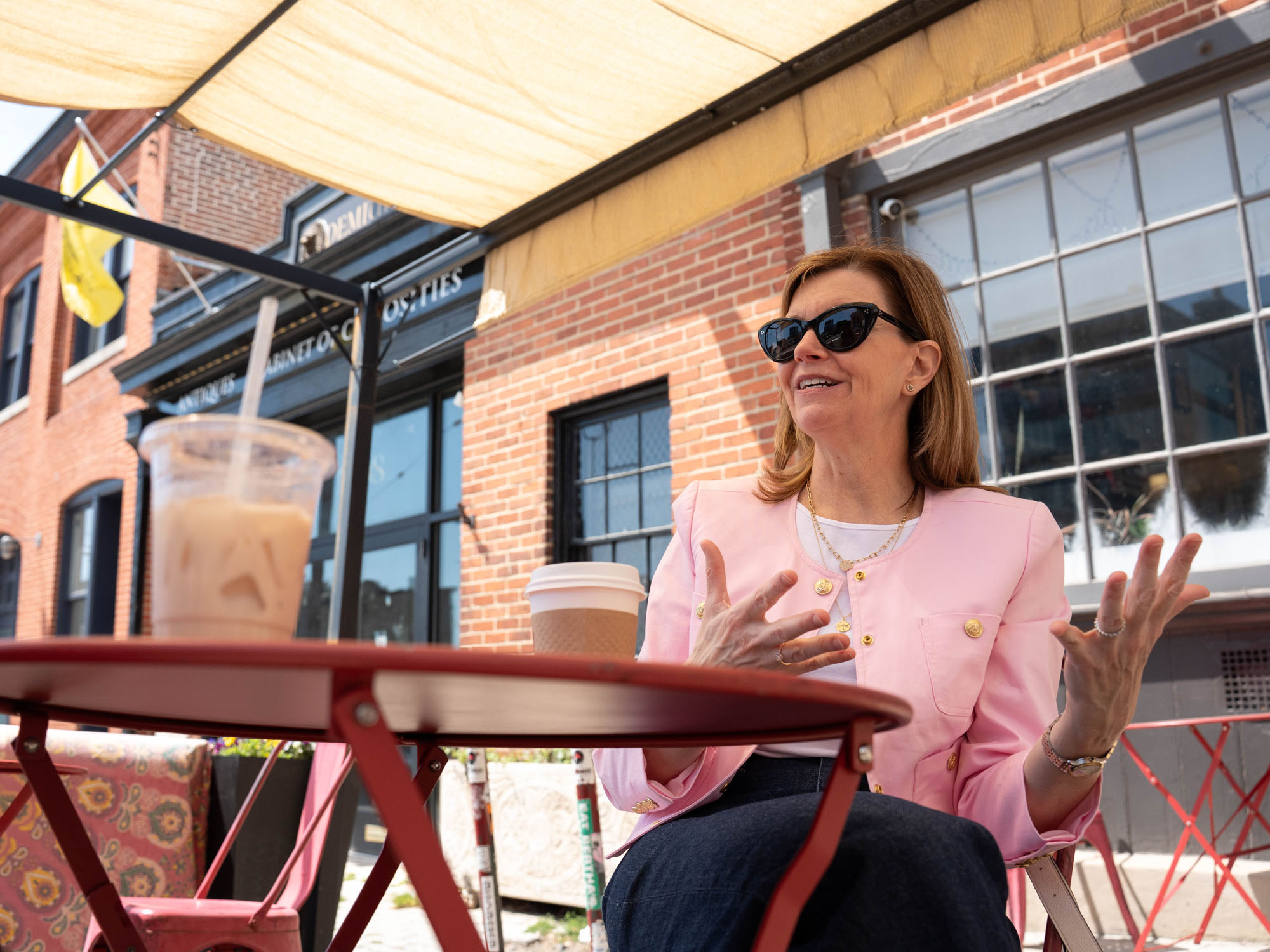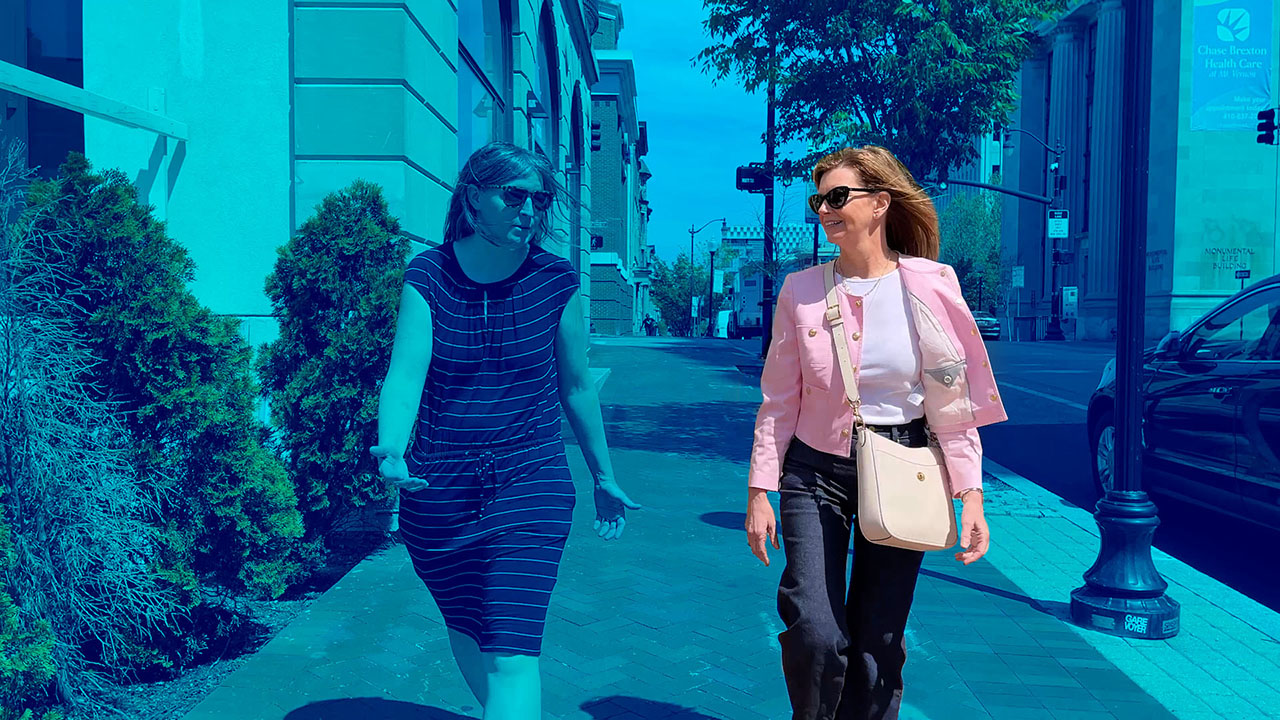From athlete to advocate, professor champions sports law
When I leave that classroom and I say, ‘We did something special here,’ I think they get it. I think I did my best, I think they brought their best, and we created something together in these 75 minutes. I have to say, those are my proudest moments. It really feels good. It never gets old.

Dionne Koller’s connection to sports started at a young age when she discovered a love for gymnastics. She planned to compete in college, but was injured her first year. Instead of giving up on her sports-centered life, she changed the part that athletics played in it.
Now, Koller is a University of Baltimore School of Law professor with a scholarly focus on sports law and director of the law school’s Center for Sport and the Law. She co-chaired the Congressional Commission on the State of U.S. Olympic and Paralympics, served as chair and a member of the executive board for the Sports Law Section of the Association of American Law Schools (AALS), and serves as a member of the United States Anti-Doping Agency’s Administrative Review Panel. In 2024, she received an AALS award for her contributions to the field, and didn’t slow down. In 2025, she published a new book, More Than Play: How Law, Policy, and Politics Shape American Youth Sport, which tackles different issues she’s followed through her career.
On a sunny spring morning, Koller took a break with jasmine tea at Baby’s on Fire, a café just a few blocks from the John and Frances Angelos Law Center, to talk about her passion for sports law, the myths around it, and what she loves about this sports-loving city.
Q: What drove your interest in sports law?
A: I was an athlete growing up, so I was interested in sports and when I looked at launching my legal academic career, I saw that sports law was a field that was really just starting, and there was an opportunity to help define what sports law is, to create new knowledge and to really build in this area. It's something that I personally love so much, but also, I saw a great professional opportunity, which is to be a part of helping to establish this as a field of legal academic inquiry. It was exciting on both fronts.
Q: Your new book, More Than Play: How Law, Policy, and Politics Shape American Youth Sport, started out as a paper you wrote three years ago at Harvard Law School. Can you tell us about your desire to build that paper into something more, even if it took longer to produce, and what conversations you hope will come out of this work?
A: Turning that paper into a book, I think, really shows the power of connections—talking to people and people supporting other people. As I built that paper, I gave talks about it, I talked to my colleagues about it, and people kept saying to me the same thing: This sounds like a book. I'd never written a book before, so that seemed like a huge mountain to climb. But when a lot of people are telling you, this project sounds bigger than that, and we think you can be the one to do it, that gave me the motivation to say, OK, let's make this into something more.
After it was published as a paper, I decided to continue to build out the arguments that I was making. The effect of parents and the law in that space around parent-child relationships, family relationships, and legal assumptions around parenting and children I was able to develop much more for the book. Similarly, I was able to build out much more of sports law and theoretical approaches to that, and then fit youth sports into that. In the paper, I just had to go right into, here's what's happening in youth sports. I was excited to be able to look at those two things much more closely. Without the support of the University of Baltimore community, my colleagues, people in the sports law field, saying you've got something here and you should see it through, it would have been hard to visualize.


Q: What’s a case in sports law that you think about often?
A: By far, the case I think about most often is one called Flood vs. Kuhn. It's the story of a Major League Baseball player—you could say one of the best ever—Curt Flood, who, back in the late 1960s played for the St. Louis Cardinals. He was pretty much the top player at the time, and this was a time when baseball didn't have what we now have and take for granted, which is free agency. After a certain number of years, players today can go and make a deal with a different team. They have control over their careers in that way, they have the ability to make a better deal and go to another team where they’d like to play. That was not the case at the time Curt Flood was in the game.
Curt Flood brought a very famous lawsuit that made it all the way to the Supreme Court, challenging the restrictions on players that said, when you sign for a team, you are that team's property for the duration of your career—it was called the “reserve clause.” That team could decide to trade you, but the reserve clause completely controlled where you played, and it limited a player’s ability to negotiate a better salary. Curt Flood challenged that because the St. Louis Cardinals decided to trade him to the Philadelphia Phillies. He didn't want to play for the Phillies, and he brought a lawsuit that went all the way to the Supreme Court. The Supreme Court basically issued an opinion that said he's right on the legal merits, but we're not going to change it, because baseball is special, essentially.
I think about that case a lot because it's a great example of sports exceptionalism. This is an extraordinary thing that an individual did not have control over his career, the way, again, we take for granted now. It's a very striking case, because the whole first section of the opinion are just names of famous baseball players, where the Supreme Court, in hearing this man's claim, decided to spend a lot of time honoring their favorite baseball players. So, the case is extraordinary for so many reasons, and I think about it a lot because I think Curt Flood sacrificed a lot to make the game better for players today.
The rule changed only a few years after he lost that lawsuit at the Supreme Court. The baseball players union got stronger. A player went to private arbitration and challenged the restrictions on player movement, and free agency started, and we've never looked back.
Q: What’s a moment you can point to in your professional career that you’re most proud of?
A: There are lots of little moments and the one I like the best is when you're in a classroom, when you spend 75 minutes with students, and you're working hard on something, whatever the topic is for the day. When I leave that classroom and I say, ‘We did something special here,’ I think they get it. I think I did my best, I think they brought their best, and we created something together in these 75 minutes. I have to say, those are my proudest moments. It really feels good. It never gets old.
Q: What is the most important lesson you hope today’s students gain during law school?
A: There are so many things that we want students to learn during their time in law school, but I think above all, what I want students to take away is you can be nervous, you can make mistakes, you do not have to be perfect, but more than anything, you have to learn how to give your best effort and really commit to that. Learning how to do your best even when you aren't at your best, I think, is the key lesson that I would want students to learn. And I think everything else takes care of itself.

WHAT CHARMS US
We end our Charles Street Chats with the same question: What do you love most about Baltimore? Here’s Dionne’s answer.
There are really three things that I love about the city.
One, I love the people that I meet here. It's just a different type of vibe than, say, the Washington, D.C., vibe. Two, I love the neighborhoods, and I love discovering new places.
And I think the third thing is consistent with who I am and what I like: I love the sports teams and sports culture. It's really fun to teach a class on the day that the Ravens have a Monday Night Football game, and everybody's in purple, and my students today, they're going to the Orioles game. There's so much spirit. The sports teams are good to the city, and the city loves them back.

